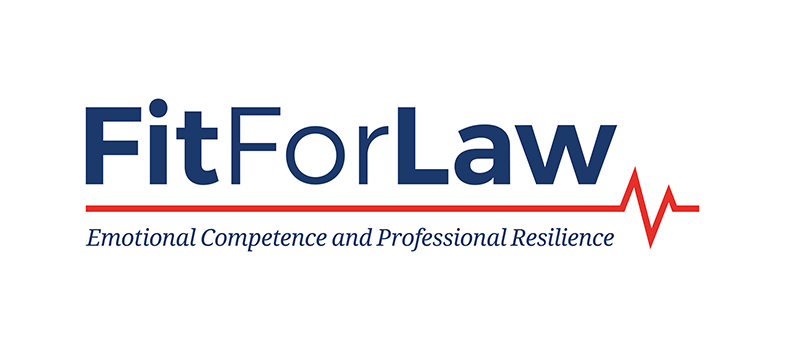Introduction to Fit for Law
1. Welcome to Fit for Law
This section includes:
- 1 video
- Introductory text
- An information box on “Which legal professionals does this course apply to?”
- 1 activity on “Is the legal profession really Fit for Law?”
You should allow yourself 20 minutes to complete this section.

Welcome to our online educational training designed to up-skill legal practitioners and employers by developing a better, evidenced-based understanding of emotional competence and professional resilience. The overall aim of this course is to help support emotionally and psychologically healthy ways of working within the legal profession.
The term “emotional competence” refers here to the importance of recognising and utilising emotion within legal practice to enhance working practices and improve mental wellbeing. Emotional competence involves a range of skills, including being able to:
- Identify, recognise and understand emotions
- Analyse and reflect on emotions
- Use emotions to enhance thinking
- Manage and regulate emotional responses in a way which assists reasoning and is appropriate in the context
- Learn to cooperatively combine emotional and intellectual thinking to improve decision-making.
(Mayer et al, 2004; Caruso and Salovey, 2004)
The range of skills this involves are not fixed or dispositional. In other words, they can be taught, meaning individuals can develop and improve their emotional competence (Boyatzis, Goleman & Rhee, 2000).
The term “professional resilience” refers to the ability of individuals to not only survive but also thrive in a potentially tough and challenging working environment. Being resilient involves being able to adjust and positively adapt to change and adversity (Luthar, Cicchetti & Becker, 2000). Resilience is a dynamic process, focusing on how individuals interact with their environment when dealing with challenges and setbacks.
For example, on a daily basis it might be a challenge for you to meet deadlines or billing requirements and it may be a setback for you if you are unable to meet these. In the face of difficulties and challenges, resilience allows individuals to manage, respond and “bounce back”. As with emotional competence, resilience is not a personality trait or fixed, so it can be learnt (Bernard, 2004).
Fostering better emotional competence and professional resilience involves working on skills that can be learnt and developed. However, you may notice that you find it easier to develop some skills than others and that is perfectly normal. Thinking about which skills you have, or need to work on, can help you when you are assessing your professional strengths and weaknesses (for example, to decide whether a particular role or responsibility is right for you).
Is the legal profession really Fit for Law?
Consider the statement below and then click on the link (in red) to go to an opinion poll where you can give your view on this anonymously and also see the opinions expressed by other legal professionals who have used this course. Afterwards, return to this page and click on Reveal comment to get an overview on this statement.
“Most legal professionals are psychologically and emotionally healthy”
Click here to go to the poll. [Tip: hold Ctrl and click a link to open it in a new tab. (Hide tip)]
Comment
Of course, there is no “right” answer to this question, but it is worth taking a moment to reflect on the reasons for your answer. If you are a twitter user, you can also comment using #FitforLaw. It is also worth bearing in mind that it would be unusual for anyone to be emotionally and psychologically healthy all the time. Just like with physical health - everyone gets a cold or flu occasionally - your mental health is not fixed and static.
The concepts of emotional competence and professional resilience do not just relate to the competence and resilience of individual legal practitioners. Although individuals have personal characteristics that can help strengthen their professional resilience (such as belief in their own abilities), there are wider factors which also influence it (such as having supportive personal and professional relationships).
It is not only about individual responses and individual effort. Instead, it is vital that the wider legal working environment and culture of law also acknowledge their importance by recognising both the evidence-base for their inclusion and the practical changes that are necessary. Therefore, this course is divided into three parts:
- Managing and understanding yourself
- Working with others (under development)
- Employer and stakeholder toolkit (under development).
The parts of this course can be studied at your own pace. Each part can also be worked through as a stand-alone set of materials. We would recommend that you allow a total of between two to four hours for each part. In addition, the course contains an Additional resources section with further resources and guidance to access in relation to each part.
The course has been developed by a team of authors at The Open University for the charity LawCare. More information about the authors and LawCare can be found here. Throughout the course you will also find a range of quotations from legal professionals which are taken from the recordings of five focus groups held in the United Kingdom (“UK”) and Republic of Ireland in February 2018 to demonstrate a range of experiences and perspectives.
As well as working through this course, you can join in the conversation on Twitter using #FitforLaw or by applying to join our closed Facebook group “Fit for Law”. If you are concerned about confidentiality, you can create a new profile to join this group, providing you answer the three questions sent to you when you apply to join the group honestly.
Which legal professionals does this course apply to?
This course applies to all legal professionals within the UK and the Republic of Ireland, including (but, as in all legal documents, without limitation!)
- Advocates
- Apprentices
- Barristers
- Barrister’s Clerks
- Case workers
- Chartered conveyancers
- Chartered legal executives
- Devils
- In-House Lawyers
- Judges
- Magistrates
- Paralegals
- Patent attorneys
- Pupils
- Sheriffs
- Sole practitioners
- Solicitors
- Support staff
- Trademark Attorneys
- Trainees.
Although the focus is on legal practice in the UK and the Republic of Ireland, much of what is included will also be relevant in other jurisdictions.

